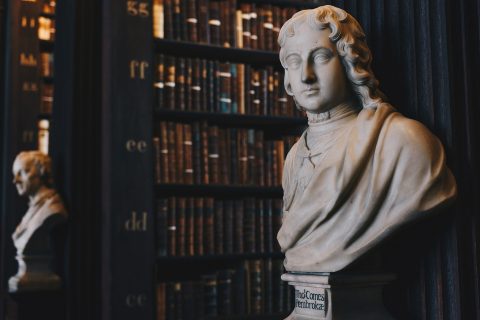English and History (BA)
Why study English and History?
Take on the narrative of the human story, through analysis and the re-interpretation of historical events. Challenge your assumptions about the human condition by reflecting on the lives represented in literary texts from ancient Anglo-Saxons to contemporary post-colonial voices from around the world.
The Joint Specialization in English and History will help you develop a vocabulary for making thematic connections across time. The course requirements are designed to allow you to examine the same period of history and literature in tandem, or pick complementary periods by topic.
Program highlights
- Unique multidisciplinary program within single Specialization
- Small lecture classes at advanced level
Special funding for out-of-province students
Up to $4000 for undergraduate programs.
Program structure
A Bachelor of Arts degree takes a minimum of three or four years (90 – 120 credits) of full-time study, depending on your academic background.
Program option
- Joint Specialization in English and History
(30 credits in English, 30 credits in History)
Courses
United States students: A U.S. Federal Student Aid-eligible version of this program is offered. This version meets all U.S. regulations (such as no co-operative education or e-courses) for eligible programs.
Admission criteria
Minimum cut-off averages and course requirements
- Quebec CEGEP: 20
- High School: C+
- ACT or SAT is NOT required
- Canadian curricula course requirements
- Accepted international qualifications
- International Baccalaureate (IB) diploma: 26
- Baccalauréat français: 11
- British system of education (GCE):
- A-levels: At least two A-level exams CD or
- AS-levels: At least 4 AS-level exams with equivalent results or
- BTEC: Level 3 Diploma or Extended Diploma in a related subject area with equivalent results
- Additional information for British System of Education (GCE) applicants
- University Transfers (internal/external): C
Additional requirements for admission
English proficiency
Some applicants may be required to write an English language proficiency test with the following minimum scores:
- TOEFL iBT (internet-based test) – a minimum score of 100 with 22 in the writing component
- IELTS – 7.0 overall with a 6.5 in the writing component
- DET score of 120 and above with no subscore under 90
Minimum cut-off averages should be used as indicators. The cut-off data may change depending on the applicant pool. Applicants who meet the stated minimum requirements are not guaranteed admission to these programs.
Application deadlines

FALL TERM
March 1 is the deadline to apply for fall term entry. International students are encouraged to apply by February 1 to allow sufficient time for CAQ and study permit application processing.

WINTER
November 1 is the deadline to apply for winter term entry. International students are encouraged to apply by September 1 to allow sufficient time for CAQ and study permit application processing.
Not all programs are available for winter term entry. Please check program availability for the term, before you start your application.
We reserve the right to close admission to a program at any time after the official deadline without prior notice.
Student story

Hannah Pelletier
Joint Specialization English and History
Concordia is fun. I like the adventures of trying new classes and meeting professors.

Olivia Taddio
Joint Specialization English and History
The English and History program required you to have excellent writing skills and it helped me become a strong writer.
Other programs of interest

Delving into the Irish experience will anchor and expand your understanding of the issues facing our planet today. The people of Ireland have a history that includes colonisation, famine, diaspora, civil war, partition, and the Troubles.
Department
Faculty

Immerse yourself in the words of past poets or contemporary thinkers. With every turn of the page you have the opportunity to imagine and reflect on lives and worlds different from your own experience, and challenge your assumptions about the meaning of morality and the world from new and unanticipated perspectives.
Department
Faculty

Investigate the mysteries of the past. Historians are detectives, picking up a loose thread in the social fabric and unraveling it to weave a new narrative through time
Department
Faculty


